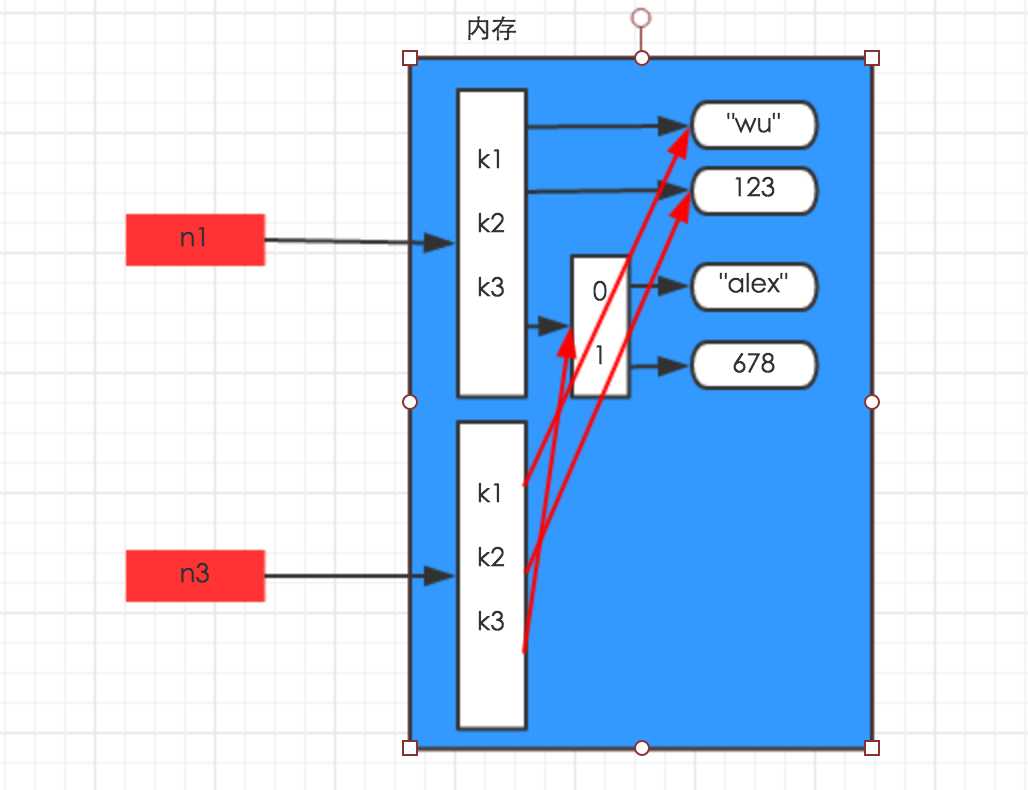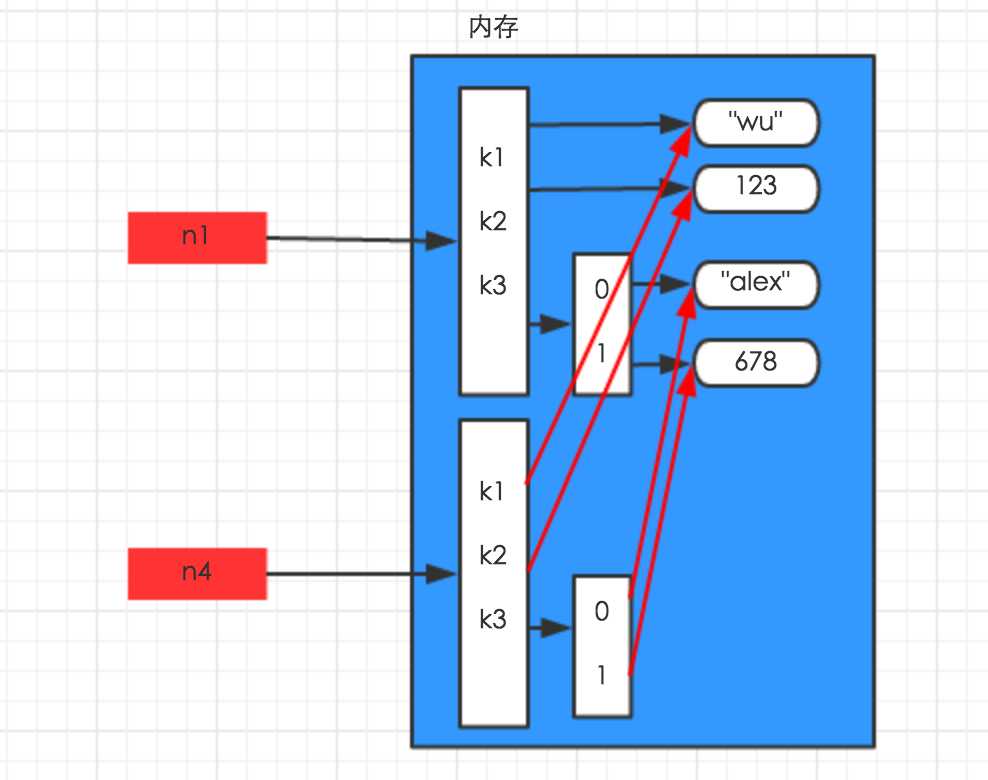python基础,,一、python三元
python基础,,一、python三元
一、python三元运算
二、基本数据类型之集合
三、赋值和深浅拷贝
四、自定义函数的创建、调用和函数参数
五、练习
一、python三元运算
result = 值1 if 条件 else 值2 :如果条件成立则result等于值1 ,否则等于值2
二、set 集合
set 是一个无序且不重复的元素集合,支持并集、交集、差集、对称差集等数学运算,set不记录元素位置,因此不支持索引,分片等操作。声名方法:SET_NAME = set()
SET_NAME = {1,2,3,4.....} (不能用此方法创建空集合,系统会认为是创建一个空字典。)方法:
3.方法:

class set(object): """ set() -> new empty set object set(iterable) -> new set object Build an unordered collection of unique elements. """ def add(self, *args, **kwargs): # real signature unknown """ Add an element to a set. 添加元素 This has no effect if the element is already present. """ pass def clear(self, *args, **kwargs): # real signature unknown """ Remove all elements from this set. 从集合中移除所有元素 """ pass def copy(self, *args, **kwargs): # real signature unknown """ Return a shallow copy of a set. 浅拷贝 """ pass def difference(self, *args, **kwargs): # real signature unknown """ Return the difference of two or more sets as a new set. 返回两个或多个集合中的不同值并将这些不同值生成一个新的集合。 (i.e. all elements that are in this set but not the others.) """ pass def difference_update(self, *args, **kwargs): # real signature unknown """ Remove all elements of another set from this set. 从当前集合中删除和b中相同的元素 """ pass def discard(self, *args, **kwargs): # real signature unknown """ Remove an element from a set if it is a member. If the element is not a member, do nothing. 移除指定元素,如果元素不存在不报错 """ pass def intersection(self, *args, **kwargs): # real signature unknown """ Return the intersection of two sets as a new set. 返回两个集合的交集将其生成一个新的集合 (i.e. all elements that are in both sets.) """ pass def intersection_update(self, *args, **kwargs): # real signature unknown """ Update a set with the intersection of itself and another. 取交集并更新到A中 """ pass def isdisjoint(self, *args, **kwargs): # real signature unknown """ Return True if two sets have a null intersection. 如果没有交集则返回True,否则返回False """ pass def issubset(self, *args, **kwargs): # real signature unknown """ Report whether another set contains this set. 是否是子序列 """ pass def issuperset(self, *args, **kwargs): # real signature unknown """ Report whether this set contains another set. 是否是父序列 """ pass def pop(self, *args, **kwargs): # real signature unknown """ Remove and return an arbitrary set element. Raises KeyError if the set is empty. 移除指定元素,并返回结果 """ pass def remove(self, *args, **kwargs): # real signature unknown """ Remove an element from a set; it must be a member. If the element is not a member, raise a KeyError. 移除指定元素,不存在不报错 """ pass def symmetric_difference(self, *args, **kwargs): # real signature unknown """ Return the symmetric difference of two sets as a new set. (i.e. all elements that are in exactly one of the sets.) 对称交集 """ pass def symmetric_difference_update(self, *args, **kwargs): # real signature unknown """ Update a set with the symmetric difference of itself and another. 对称交集,并更新到A中 """ pass def union(self, *args, **kwargs): # real signature unknown """ Return the union of sets as a new set. (i.e. all elements that are in either set.) 并集 """ pass def update(self, *args, **kwargs): # real signature unknown """ Update a set with the union of itself and others. 更新 """ pass def __and__(self, *args, **kwargs): # real signature unknown """ Return self&value. """ pass def __contains__(self, y): # real signature unknown; restored from __doc__ """ x.__contains__(y) <==> y in x. """ pass def __eq__(self, *args, **kwargs): # real signature unknown """ Return self==value. """ pass def __getattribute__(self, *args, **kwargs): # real signature unknown """ Return getattr(self, name). """ pass def __ge__(self, *args, **kwargs): # real signature unknown """ Return self>=value. """ pass def __gt__(self, *args, **kwargs): # real signature unknown """ Return self>value. """ pass def __iand__(self, *args, **kwargs): # real signature unknown """ Return self&=value. """ pass def __init__(self, seq=()): # known special case of set.__init__ """ set() -> new empty set object set(iterable) -> new set object Build an unordered collection of unique elements. # (copied from class doc) """ pass def __ior__(self, *args, **kwargs): # real signature unknown """ Return self|=value. """ pass def __isub__(self, *args, **kwargs): # real signature unknown """ Return self-=value. """ pass def __iter__(self, *args, **kwargs): # real signature unknown """ Implement iter(self). """ pass def __ixor__(self, *args, **kwargs): # real signature unknown """ Return self^=value. """ pass def __len__(self, *args, **kwargs): # real signature unknown """ Return len(self). """ pass def __le__(self, *args, **kwargs): # real signature unknown """ Return self<=value. """ pass def __lt__(self, *args, **kwargs): # real signature unknown """ Return self<value. """ pass @staticmethod # known case of __new__ def __new__(*args, **kwargs): # real signature unknown """ Create and return a new object. See help(type) for accurate signature. """ pass def __ne__(self, *args, **kwargs): # real signature unknown """ Return self!=value. """ pass def __or__(self, *args, **kwargs): # real signature unknown """ Return self|value. """ pass def __rand__(self, *args, **kwargs): # real signature unknown """ Return value&self. """ pass def __reduce__(self, *args, **kwargs): # real signature unknown """ Return state information for pickling. """ pass def __repr__(self, *args, **kwargs): # real signature unknown """ Return repr(self). """ pass def __ror__(self, *args, **kwargs): # real signature unknown """ Return value|self. """ pass def __rsub__(self, *args, **kwargs): # real signature unknown """ Return value-self. """ pass def __rxor__(self, *args, **kwargs): # real signature unknown """ Return value^self. """ pass def __sizeof__(self): # real signature unknown; restored from __doc__ """ S.__sizeof__() -> size of S in memory, in bytes """ pass def __sub__(self, *args, **kwargs): # real signature unknown """ Return self-value. """ pass def __xor__(self, *args, **kwargs): # real signature unknown """ Return self^value. """ pass __hash__ = NoneView Code
三、赋值和深浅拷贝
赋值:a = 3
b = a
a,b指向同一片内存地址,可以使用id()来查看,赋值操作不会开辟新的内存空间,它只是复制了新对象的引用。在这只是增加了b这个变量名的内存。
如果想修改一个对象并且让原始对象不受影响,就需要进行复制(拷贝)操作。
数字的字符串还能被拷贝
如果元组内只包含数字或字符串则不能深拷贝
1.浅拷贝(shallow copy):
创建方式:
import copy
copy.copy()
浅拷贝在内存中只额创建第一层数据。
import copyn1 = {‘k1‘:‘wu‘,‘k2‘:123;‘k3‘:[‘alex‘,456]}n3 = copy.copy(n1)
2.深拷贝:
创建方式:
import copy
copy.deepcopy()
深拷贝,在内存中将所有的数据重新创建一份(排除最后一层,即:python内部对数字和字符串的优化。)
import copyn1 = {‘k1‘:‘wu‘,‘k2‘:123,‘k3‘:[‘alex‘,456]}n4 = copy.deepcopy(n1)
四、自定义函数的创建、调用和函数参数
函数是将一些代码组织到一起可以实现特定功能的代码块,将重复率较高的代码封装到函数中,需要时调用函数就可以实现功能。
1.自定义函数的创建
def 函数名(形参): 函数体 .... 返回值def:创建函数的关键字函数名:函数的名称,以后可根据函数名调用函数函数体:函数中进行一系列的逻辑运算形参:为函数体提供数据返回值:当函数执行完毕后,可以给调用者返回数据,如果不指定默认返回None
python基础
相关内容
- 暂无相关文章



评论关闭